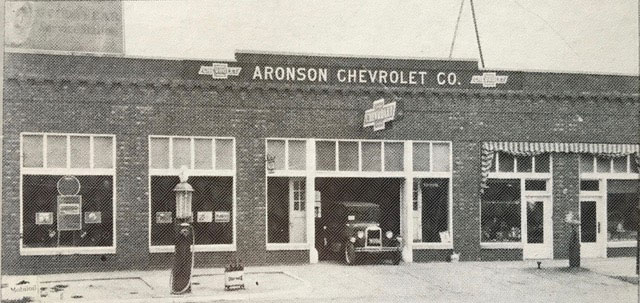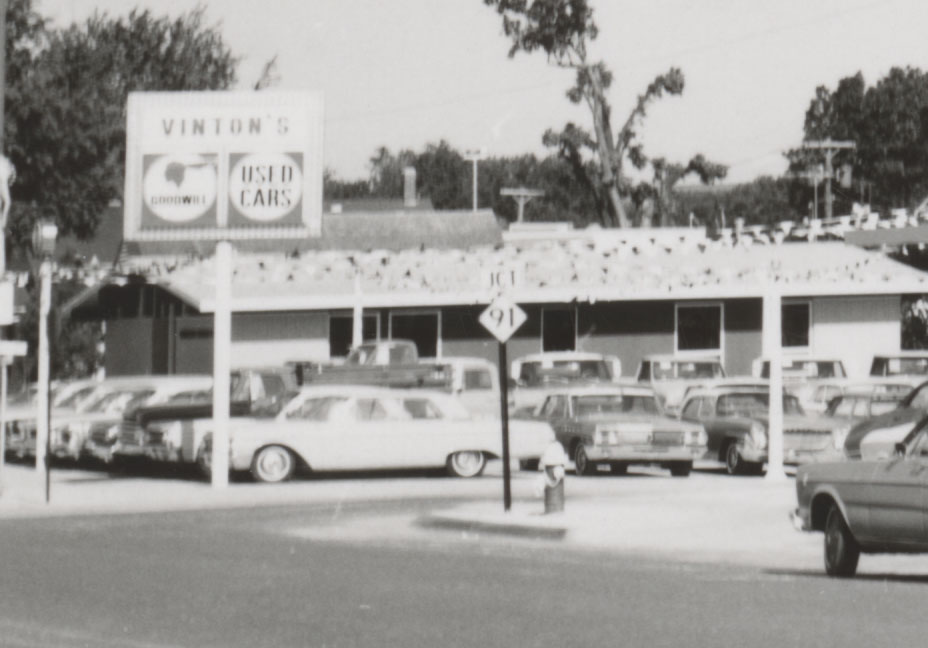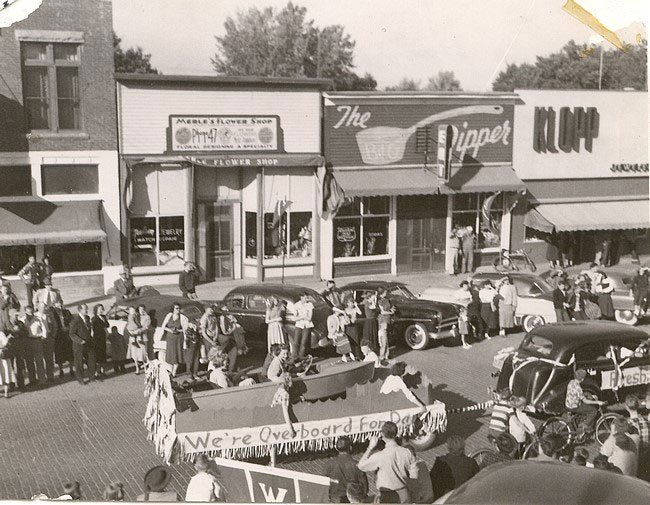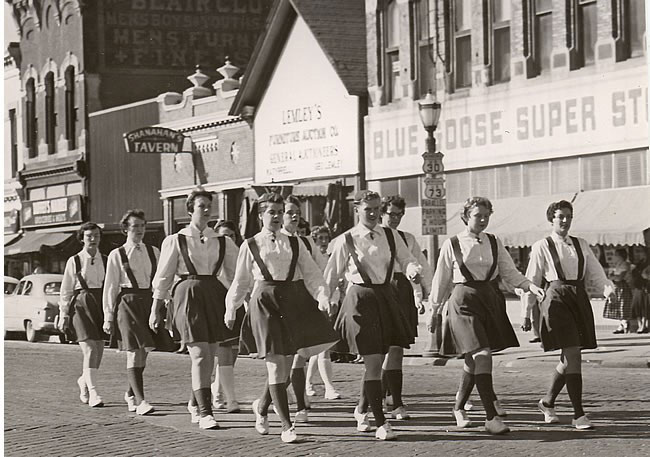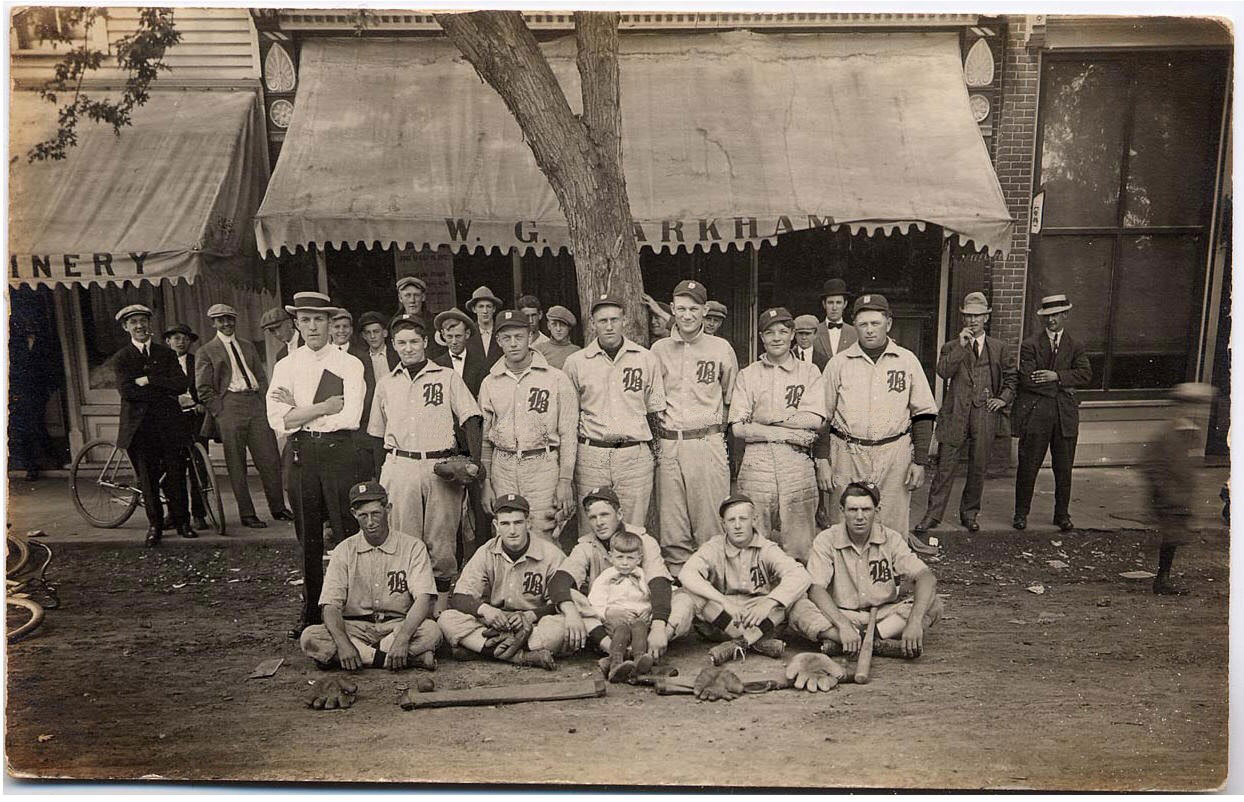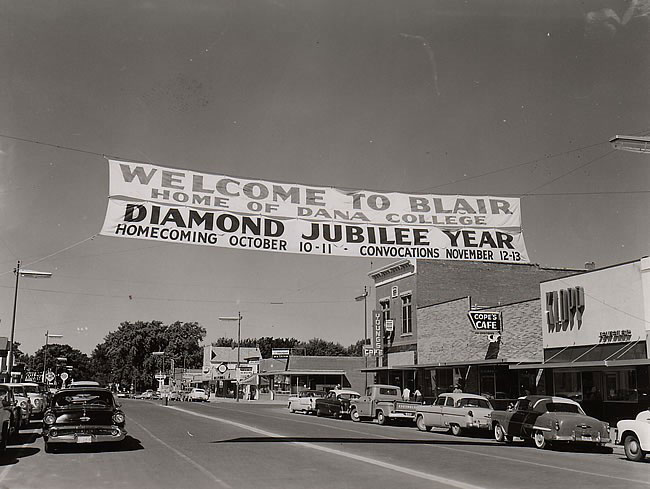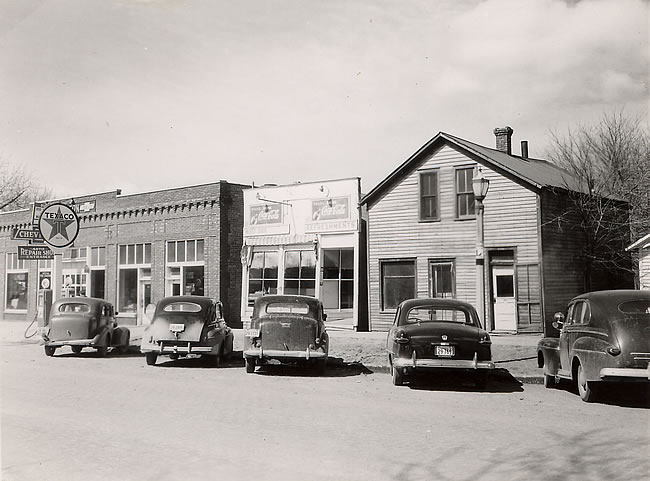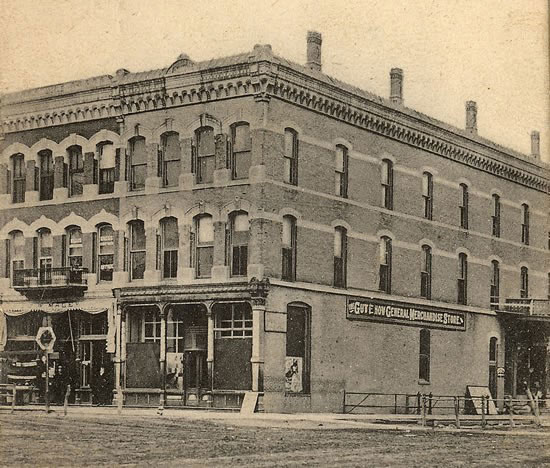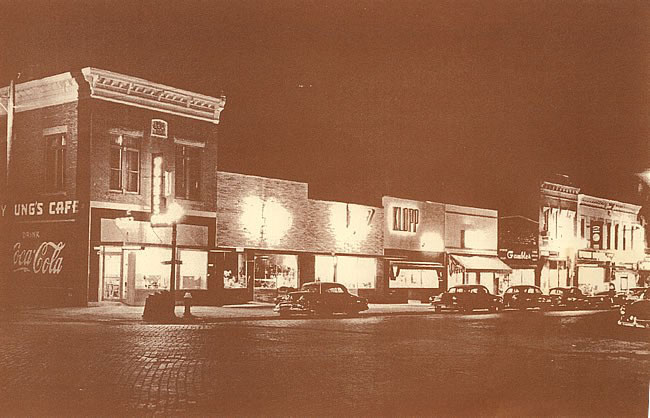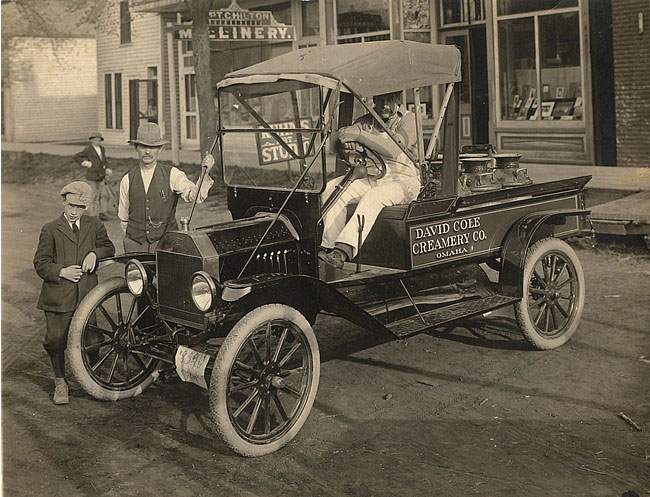Home > Archive > F.W. Kenny House > Keeley Institute
Grand opening of the Keeley Institute

The Blair Courier, Vol 3, No. 30. Jan. 23, 1892
Grand Opening
The New Keeley Opening One of the Grandest Events ever Known in This City.
The attendance from Abroad was Very Large and Select.
Keeley’s Masterly Talk
History of the Bi-Chloride of Gold Cure from its Discoverer, Dr. Keeley.
Thursday night the new Keeley Institute was formally opened and it has never been the opportunity of the people of this city to see such a gathering of people from all parts of the county come together, and it will be many days and years when another such assemblage will do honor to this beautiful little city. Dr. Keeley arrived on the evening train and was met at the depot by the reception committee, headed by Dr. B. F. Monroe. Farther on will be found a general review of the evening:
Inasmuch as this issue is devoted largely to the new Keeley Institute formally opened on Thursday evening last for the reception, treatment and cure of all inebriates who may choose to enter within its walls, it is mete and proper that the Courier as the leading home paper should be the first in the field giving its hundreds of readers a minute and carefully written description of this wonderful institution, together with the history of the cure, the discovery of it, and that much talked of discoverer Dr. Leslie E. Keeley, as well as the gentlemen who compose the Nebraska company; and while we are doing this it necessarily devolves upon up to give a brief description of our little city of Blair, for the benefit of those into whose hands a copy of this paper may fall, and who have never been so fortunate as to visit us and spend a day or two in looking around.

In the first place we wish to emphasize the fact (and a visit to our town will prove it,) that Blair is the coolest and prettiest town during spring, summer and autumn to be found anywhere in the state, if not anywhere in the West, and her well built business and residence houses, with their cheerful light, glowing base burners, and pleasant and agreeable inmates, make it not a bad place to stay these cold days when mercury registers 35 degrees below zero.
Blair is the county seat of Washington County, and is located near the center of population. It is twenty-five miles from Omaha, and is the largest town between Omaha and Sioux City, its present population numbering more than 3,100 souls. Its buildings are brick and frame, and it is situated about one and a half miles from the Missouri river, the nearest point being the mammoth iron bridge of the F.E. & M.V. railroad company. It is built upon bench or second bottom land, the entire county being dotted with lovely homes inhabited by an enterprising prosperous and centered people.
The city is surrounded by fruitful orchards and vineyards, this being the Egypt of the Elkhorn county to the north and west extending far into the Black Hills and Wyoming.
The charming scenes that are unfolded to the eyes of visitors by a drive through the county, are indelibly impressed upon the memory, and no difference how strong the affections for their homes in other parts, there is an indescribable fascination that comes over everyone who remains for an indefinite period. There is scarcely an individual who remains here for three weeks but what finds that it requires an effort to shake off the attachments that have insensibly stolen over him. We have a number of instances in point where patients attending the Keeley Institute and other have become permanent citizens. The suburban growth of the city during the past year is notable, and our building and loan association and a large amount of private capital already here, will push improvements the coming year.
Blair has a well equipped and efficient fire department, and a system of water works of which all her people are justly proud, the mains traversing all portions of the city and well into the suburbs. The water is pure, clear and sweet, the supply being forced from wells by a powerful engine to a large reservoir on top of a high bluff just south of town, and is furnished in unstinted quantities for household use and for sprinkling our hundreds of beautiful lawns and gardens, and our broad and finely laid out streets.
Our system of lighting is electric, and the entire city is lighted from large lamps suspended over the streets at a height of about 30 feet at frequent intervals. The brilliancy of the illumination which extends to every portion of the city is the delight of every inhabitant and a sure preventative of crime, and the foot-pad and burglar find no opportunity to ply their vocations. All the business houses and as many of the private residence as desire them are lighted by the same system.
Our hotel accommodations are first-class, and when a stranger arrives within our gates he may rest assured he will be well fed and entertained.
We have a large opera house in which all the best troupes give entertainments, and are well patronized. Three lovely little and well shaded parks, and a large base ball park with one of the leading teams of the state.
Blair is on the main line of the F., E. & M. V. and C., St. P., M. & O. railroads, leading to the four points of the compass, all trains arriving and departing from the Union depo [sic] at the intersection of Front and Seventh streets, with the exception of the St. Paul limited and trains from South Omaha to Chicago over the C. & N. W., which arrive and depart from the South Blair Depo [sic] at the foot of Colfax street. Daily twelve passenger trains stop at Blair, making it one of the most important and accessible railroad points in Nebraska.
Our well kept streets, shaded on either side by magnificent trees, are the delight of our people, and the cool walks are well patronizd [sic] by ladies and gentlemen during the warmer months. Blair enjoys the reputation of being the shadiest town anywhere in the state.
Our public highways extend in all directions, affording beautiful and pleasant drives, greatly enhanced by beautiful home, fertile fields and magnificent scenery. The entire country around Blair abounds in good roads.
We might go on with column after column, but we have given you a glimpse of our prosperous and happy little city which is just 22 years old and is beginning to put on manhood airs. We wish to conclude by saying that the people of Blair are of the salt of the earth, endowed with the grace from on high that make one at home among them, and leaves a tender memory in the hearts after separation. The poor are cared for, the afflicted are healed, and the broken hearted are comforted. The people of Blair are ever stretching forth a helping hand to unfortunate humanity and lifting them up, and their doors and the doors of their churches are thrown wide open in hospitality, sociability and mercy.
Dr. Leslie Keeley

Dr. Leslie E. Keeley
The praise for Dr. Leslie E. Keeley, of Dwight, Ill., is perhaps being sung from more hearthstones than for any other man in the United States today. Twenty years ago Dr. Keeley was a physician at Dwight, unknown outside of his own county, was a strong advocate of temperance, and enunciated the doctrine that alcoholism is a disease that can be cured like any other bodily ailment, and he began his investigations and experiments to discover a remedy, and his Bi-Chloride of Gold is the result of his studies, and it has now been about twelve years since he called for patients. He was denounced by the medical faculty as a charlatan because he kept secret the composition of his remedy from the medical profession. But for the past twelve years the Keeley treatment has made its way until today, Institutes have been opened in a number of the states, the Blair Keeley company being among the first organized.
Dr. Keeley is not a gentleman given to braggadocio, but is unassuming and sincere in all he does. He does not thrust himself upon a community, neither does he make a habit of selecting from among his patients those who will write long testimonials advertising him or his cure. The remarkable cures he has effected is enough. The Blair Company was formed for the establishment of a Keeley Institute in this state on the 14th day of April, 1891.
By the use of the Double Chloride of Gold remedies all cases of liquor, opium, morphine, cocaine and tobacco habits are permanently cured; also neurasthenia or nerve exhaustion, from which many person, especially ladies, suffer.
Dr. B. F. Monroe went to Dwight to investigate the Cure and take instructions for administering the remedy to patients, and Dr. Keeley personally imparted to him all the instructions necessary for the successful application of his Bi-Chloride of Gold remedies. The Dr. returned to Blair immediately, and temporary office, shot room, etc., were secured in the Monroe Block. But by the last of August it was found that their quarters were too small in which to transact their business and accommodate their rapidly increasing number, and so began to cast about for more convenient quarters. Failing to find property they could obtain at a fair price, the company decided upon building a fine Institute, an illustration of which is seen upon this page.
On the 10th day of July the Institute has fourteen patients, and the increase has been gradual up to the present time, the number now being increased to more than one hundred.
The cure of liquor or opium cases is effected in three weeks by means of a thorough course of medication at the Institute under the care of Dr. Monroe which results in destroying the appetite for the noxious drug, eradicates its effects upon the system, rebuilds the destroyed nerve tissues, and leaves the patient in a normal, healthy condition. The medicine contains no drug that will create an appetite for itself, and does not interfere with treatment for any other ailment, nor aggravate wounds, but assists nature in performing its proper functions.
There seems to be in the human economy an imperative demand for either stimulants, sedatives or narcotics; and indeed, the use of one requires the other. If the use of tobacco or any other narcotic depresses the nervous system, there is an immediate demand for a stimulant to restore the equilibrium, and vice versa. The demand for and the use of tobacco has increased remarkably during the last decade, until it has become almost universal in our county.
Tobacco is a powerful sedative. It gives rise to confusion of the head in vetigo, stupor, faintness, nausea, vomiting and general depression of the nervous and circulatory functions, which many times eventuates in alarming and even fatal prostrations, ending in death. It lays the foundation of nearly every serious nerve disorder now common to the people of America. It brings about epilepsy, bronchitis, rheumatism and asthma. It is the promoter of dyspepsia and catarrh. It afflicts it votaries by what has lately been known to the profession as “tobacco-heart” and cancer of the stomach.
The mental disorganization of the nervous system, caused by tobacco abuse, is frequently observed in severe facial neuralgia, which is not unfrequently [sic] limited to one side. The patient will experience all the forms of sick and nervous headache, often accompanied with feelings of dizziness and utter prostration. The mental faculties become confused, and it is difficult to think consecutively and clearly, while the memory loses its grasp on previous events and fails to perform its duties satisfactorily.
Dr. Keeley has made many experiments with the various salts of gold, and has invariably found that, when properly prepared and administered, gold is an invaluable and never-failing remedy for the tobacco habit – a habit which today is sapping the foundation of American manhood and entailing disease upon all children born of tobacco-using parents.
The cigarette habit has become so prevalent in the last twenty years that in all cities they are constantly smoked by everything wearing male clothes from a bootblack to a merchant’s clerk. Too much cannot be said of this soul-sapping, body –demoralizing abomination of the present day. The make-up and contents of the cigarette generally found upon the market is that of unripe and imperfectly prepared tobacco. This tobacco is first soaked in nicotine, largely impregnated with opium, stramonium or belladonna. The wrapper is usually rice paper, whitened with arsenic. It will readily be seen, that the main evil of cigarette smoking arises from the inhalation of carbon-monoxide, which is extremely poisonous on account of its strong affinity for the hemoglobin of the blood, which brings about cardiac inhibition and heart-failure.
No patient is taken for treatment without his or her full consent. There is no coercion or restraint of personal liberty. The patient is treated as a human, and is supplied with all the things needful for comfort. Confidence is first established, and no deception will be tolerated.
Patients at the Keeley make it a point to be at all of the incoming trains, and marked attention is shown to an unfortunate should one so arrive. If able to navigate with his “jag” he is conducted by an attendant, but if not he is placed upon a stretcher and carried sick-man fashion to the Institute just across the street and a block west of the Union depot. If he is only ordinarily full he is accorded a reception.
Well, the patient arrives at the Institute. He sees the assistants and stenographers all busily engaged, get a glimpse of the fine arrangements, and requests to see the manager. Mr. W. J. Cook is then introduced to him, and after making all necessary arrangements with that end of the concern he is then introduced to Dr. Monroe.
In a moment his is asked with startling suddenness whether he is a steady or periodical drinker. He probably does not know. As a rule, however, he will say that he is periodical. One man indignantly denied being a steady drinker, because, he said, he could keep sober as long as a week at a time and had done so for many years. At any rate the question is soon decided, and after a few more purely personal questions the new man is ready for his first “shot.” He takes off his coat and after an attendant has cut a slit in the upper part of his left shirt sleeve a hyperemic injection is made.
Then somebody asks the new man if he has any whisky concealed about his person. If he has he owns up, and if he has not, he says so. If he has some it is taken from him and a substitute bottle of 8-year-old out of a barrel is given him with a request that he keep a little for the morning. Then he is handed a bottle of medicine.
He is told to report at the office at the prescribed hours, and to take his medicine regularly as the directions on bottle denote. With these little preliminaries and a copy of the rules and regulations governing his case he seeks his boarding house or hotel and he usually goes right to bed, after a careful examination of his arm to see what effect the first injection has had upon him.
Then commences his daily treatment. The injections are given four time each day, at 8, 12, 5 and 7:30 p.m. o’clock. Each is accompanied by a careful examination by Dr. Monroe, and at the same time no attempt is made to stop the whisky supply. The patient does that himself. He is allowed a bottle at each operation and in three or four days he is mighty glad to stop himself. It commences to taste badly. The eye-opener is not what it used to be and he imagines all sorts of things. He visits his fellow unfortunates in the club rooms and tell them there is no use talking about it, that Dr. Monroe fixes the whisky with some vile tasting drug, and that if he only had a good drink of good unadulterated liquor, he’s sure he could get it down and keep it there. And all that sort of thing. But it’s no use. He is given some out of the same barrel from which came his first bottle. The first was all right. The last tastes badly and like a bad penny returns with some very unpleasant experience.
Then with the forced conclusion of the ability to enjoy a good drink comes the abatement of the desire and the victim is on the road to a cure.
There is no doubt at all in connection with the Blair Keeley gold cure. It is positive. Unless a man who comes here for redemption resists with all his might the rules and regulations governing the Institute, he is bound in spite of himself to lose his appetite for the accursed liquor, and he will leave Blair happy, cured, enthusiastic, and a missionary for the gold cure cause. He can not help himself.
There are no hardships to be encountered at Blair. The rules governing the Institute are not hard to obey, and no one can possibly say that there is any inconvenience attached to them. There are no bolts or bars, no padded cells, and no watching or guarding, unless a tendency to delirium is noticed. All that is asked is that the patient report to the office for operation four times each day, and take his dose every two hours while awake, Baths are required at least twice each week, and this rule is perhaps the hardest to enforce of the whole lot. Cigarette smoking is positively prohibited, and is considered the unpardonable crime. Gambling, borrowing money or medicine are against the rules, and very severe are the reprimands in the cases where there is disobedience.
The charge for treatment and medicine is $25 per week for liquor or opium habits, board being extra and costing from $4.50 to $5.50 per week. The tobacco habit in any form can be cured in one week’s Institute treatment. The home cure for tobacco is an internal remedy and is put up in boxes containing a pair of 8-ounce bottles, one pair being sufficient for a cure, and costing $5. The neurasthenia is also sold in pairs at $8 per pair. Were it necessary we could refer to several citizens of Blair who are living monuments of what the Keeley cures can do for fallen humanity, and if you drink, chew or smoke to excess, or use opium, morphine or cocaine in any of their forms and wish to quit, come to Blair and Dr. Monroe will certainly cure you.
The daily life at Blair is peculiar. In all ages and under all conditions it is generally accepted as a fact that the best fellows, the most general, the brainest, and the brightest are drinking men. Of course this is conditional, but it is a fact that nowhere on earth can be found gathered together a company of men such as is at Blair. Each fellow knows what every other fellow is there for, and there is more of the real charity to be picked up during a stay at Blair than at any other place on earth. One can get closer to men there than anywhere else, and there are broader views, more sympathy and more display of true feeling than among any other body of men on earth. Brotherly love governs every action. Sympathy prevails in ever speech. Kindness is a duty that seems to come easier and more natural than it every did, and friendships and acquaintanceships are looked at as a matter of course. There is no mock modesty. There is no attempt to conceal facts. Nobody wants to convey the wrong impression. And there are no slurs cast, no insults offered, no aspersions made and no sarcasms indulged in. Rich and poor are on the same footing. The common enemy makes all men equal. There are no high, no low, no aristocratic, no plebeian. The laborer goes into line with the banker, the judge with the lawyer, and the doctor with them all. All are on the same level, and the same needle enters all arms. Millionaires sympathize with poor men, and all creeds and dogmas and beliefs and superstitions are thrown aside. It is one common brotherhood of men. All are enthusiastic and willing to be cured, anxious the best they can do will not help a worn and weary brother as much as he needs.
Keeley Institute Building
General Description of the Handsome and Convenient Structure.
 Situated on Front street, near the depot, and within two block of the central part of the city, is this handsome edifice. The main entrance is from Front Street, and the side entrance is reached from Sixth street. Directly opposite to the north is a large and beautiful park, well shaded in the summer, and which will be greatly improved the coming season. One block to the west on the same street is another park—or as they are known, the “Twin Parks.” The City Park is two blocks north of the Institute, and here you find a very neatly kept and convenient place to pass away the long hot days and sultry nights. Castetter park is situated in the south part of the city, and although newly started will be one of the fist in this city in the near future.
Situated on Front street, near the depot, and within two block of the central part of the city, is this handsome edifice. The main entrance is from Front Street, and the side entrance is reached from Sixth street. Directly opposite to the north is a large and beautiful park, well shaded in the summer, and which will be greatly improved the coming season. One block to the west on the same street is another park—or as they are known, the “Twin Parks.” The City Park is two blocks north of the Institute, and here you find a very neatly kept and convenient place to pass away the long hot days and sultry nights. Castetter park is situated in the south part of the city, and although newly started will be one of the fist in this city in the near future.
The cost of this Institute is in the neighborhood of $10,000. The architect was F.M. Ellis of Omaha, and the contract for this entire building was given to Mr. A.F. Cherry, of Fremont, who has done one of the most complete jobs every finished in Washington county. Mr. Cherry watches every detail of the building, and we are assured that he has given satisfaction to all connected with this structure. Lew Dulaney, of this city, did the excavation; P.P. Power did the plastering; F.C. Steele painted the outside; R.A. Twiss made the water connection and the Utica Standard Furnace was put in by Nesbit & Rogers, all of Fremont.
The main building is 30×60 feet and a wing to the south 20×37 feet. The first story has a 12-foot ceiling, the second being 10-feet, and the height of the structure is 30 feet. The balcony runs around the north and west sides, is 10 feet wide and 110 feet long. The cellar under the kitchen is 16×20 feet, and can be put in order for other purposes easily.
The first floor is divided up and will be needed for the following purposes: Beginning with the west end, there is the physician’s office 12×12 ft., drug room 8×12 ft., business office 12×12 ft., private office 8×12 ft. and a large hall running from the west entrance to the reception room which is 18×21 ½ feet, and a stairway from the basement to second story running through this room which has several entrances and exits. Then comes operating room with two doors, barber shop 8×10 ft., bath room and closets, 9×20 ft. The dining room is in the wing and is 20×29 ft., pantry 6×8 ft., kitchen 12×16 ft., with stairs leading to sleeping rooms in the second story.
The second story has a main club room 20×80 ft. with an “L” 14×18 feet. The rest of the upstairs is divided into bedrooms, nine in number, with convenient halls, closets, etc. The body of the building is painted a light lead color, trimmed white with black sashes.
Taken altogether the building is one of the most convenient and handsome in the state devoted to any similar purpose, and the projectors and builders can point with pride at the New Keeley Institute, and many will be the graduates who will look at it as they pass along in the railway coach but a few rods distant and remark: “In that Institute I was relieved of the curse of drink and made a new and better man.”
The Officers

F.W. Kenny
Mr. F. W. Kenny, Sr.
Mr. Kenny, the president of the Keeley Institute of Blair, is a gentleman so well known in this part of the state that it is poor taste for the writer to undertake the difficult task of saying anything that would be new to most of our readers, but we cannot let the opportunity pass without giving a few lines in reference to his past life.
Mr. Kenny was born in Geneva, Ashtabula county, Ohio, in 1844. There he passed his early lift going to school. Mr. Kenny also took a turn at the printers trade, but was fortunate enough to drop it before he got too far going on it.
At the outbreak of the rebellion he enlisted and was with Sherman all through the war, receiving an honorable discharge in June 1865. He returned to his home in Ohio, and remained there but a short time, going to Chicago to engage in the wholesale hardware business, where he remained for five years, traveling most of the time for the house he was connected with. At the expiration of this time he concluded to come farther west, and in 1870 he came to Blair, bought an interest in the hardware business of H.C. Riordan. Here he continued with Mr. Riordan for seven years, when Mr. J. S. Stewart purchased the interest of Mr. Riordan, and the firm became known as Kenny & Stewart. The new block was built in 1882. In January 1887, Mr. K. sold out his interest to J. H. and E. A. Stewart. The Blair State Bank was organized in 1887, Mr. Kenny being elected president, which position he has since held. The bank is located at the northeast corner of Washington street and Walker avenue, and the building is one of the finest in the county. He was one of the organizers of the Blair Canning Company, and is still a member of the board of directors. He has been a member of the Board of Education for sixteen years, three of which he served as its president. Mr. Kenny has been mayor of Blair twice, and that he gave satisfaction is evidenced by the manner in which the people in general wanted to elect him again, but he insisted on not accepting if elected. He is president of the Building and Loan Association, a prosperous and paying institution; also president of the Electric Light Company, and in all is one of the busiest gentlemen in this neck of the woods.
Mr. Kenny was married in 1871 to Miss Amy Taggart, daughter of Rev. J. M. Taggart, a gentleman who was well known and respected by the people of this county. Mrs. Kenny was also a general favorite in this city. They have seven children, five girls and two boys, the oldest being Fred W. Kenny, Jr. They reside at the corner of Grant and Fifth streets, where everything is planned to make a pleasant and comfortable home.
As president of the Keeley Institute, Mr. Kenny has been a faithful worker for this cure and the making of so many men, and he is honored and respected by many reformed men and thankful wives and children.
J. H. Stewart
Vice-President J.H. Stewart is what may be termed an essentially Blair gentleman, having been born in this county about one and one half miles from the place where he is now living, on the 11th day of July, 1857, in the same old log house which still remains intact on what is known as the Stewart farm. His early life was the same as most of the young business men brought up in smaller villages of that day. His education was all acquired here in Blair, and in 1873 graduated from the High school, having received a good common school education.
He immediately went to work for Riordan & Kenny, hardware merchants, in the store now occupied by J. H. Stewart & Co., on the 7th day of April, 1874. In 1876, J. S. Stewart, the subjects father, purchased the interest of H. C. Riordan, and the firm became known as Kenny & Stewart. This firm did business until 1881, when J. H. & E. A. Stewart purchased the Kenny interest. He then became the head of the firm and its manager, and a more successfully directed business it would be impossible to find in this county.
The present store is second to none in the state as a retail hardware. It only requires a glance at this mammoth place of business to convince you that it is conducted on high business principles.
Aside from being vice-president of the Keeley Institute, he is also a member of the board of directors; he is secretary of the Haller Proprietary Company, one of the best known patent medicine companies in the West, and is largely interested in many other improvements and interests in Blair and elsewhere; is one of the most public spirited men of the county and is always consulted on matters of interest to the well-doing of the community.
Mr. Stewart is an ardent Baptist and one of the chief supporters of the church here. He is superintendent of the Baptist Sunday School, which position is next to that held by the pastor, Mr. Sheppard. At Christmas time you will always find Mr. S. and his brother E. A. out with a wagon distributing something substantial to the poor of the city as an act of charity and a reminder of the season.
As a worker in helping fallen mankind, and especially doing all in his power to get and keep men sober, we know of no other who has taken more interest in this direction than has Mr. Stewart. He will always be found in a pleasant frame of mind when the good effects of Dr. Keeley’s bi-chloride of gold is brought to notice. With a few more such gentlemen as Mr. Stewart to help the unfortunate victims of the liquor curse, what might we not look forward to.
In September, 1884, he was married to miss Annie Gross, daughter of W. D. Gross of this city. Mrs. Stewart is a well-known and popular lady, and has always known Blair as her home from childhood. They have two children, both girls, one fire years and the other one year of age. He resides on Grant street, the aristocratic thoroughfare of the city.

Mr. T.E. Stevens
Mr. T. E. Stevens
Mr. Stevens, the treasurer, first saw the light of day away back in Vermont, in a farm house outside the now prosperous city of St. Johnsbury. He attended school at the place, and there finished his education at St. Johnsbury Academy at the age of nineteen years. Without letting his parents know of his ambition to leave the farm to take hold of some employment in the town, he laid his plans and made all arrangements to start in life in the employ of the First National Bank there, and at this young age he commenced the battle of life, which in many respects has been an eventful one. Here he remained for three and one-half years, having built himself up to the position of teller at the end of this time.
Mr. Stevens had heard of Horace Greeley having made a remark about the West, and he thought there might be something in it, so he packed his grip and started on a tour of inspection through the “wild and wooly,” arriving at Omaha in the spring of 1884. He landed in that place an utter stranger, not knowing a soul in that hard and wicked city. After looking about for something to do he received employment that next day in the Omaha National Bank as receiving teller. Here he remained for one and one-half years, when he severed his connection with them and accepted the position of paying teller of the Commercial National Bank of the same city, where he served for two years.
Here it might be mentioned that Mr. S. had not lost a day’s pay from the time he started in as a mere boy in his home bank at St. Johnsbury up to this time, of which he may justly feel proud.
But it dawned upon him about this time that he wanted to be something more than an employee, and after a long and close observation of the prospects in this part of the state he hit upon Blair as the city in which to locate, and with Hon. F. W. Kenny, Sr., and others organized the Blair State Bank in 1887. From that time to the present he has been the cashier of this prominent and prosperous banking house. He is also a member of the board of directors. The business men of Washington county are too well acquainted with his business ability, integrity and gentlemanly demeanor to call for any remarks from the writer in this direction.
We find him interested in several other lines of business. He is President of the Arlington State Bank, and a director of the same; a member of the board of directors of the Blair Separable Horse Collar and Manufacturing Company and its treasurer; holds the same two positions in the Blair Building and Loan Association; is interested in a similar company at Omaha; and last, but by no means least, is the treasurer of the Keeley Institute, and a member of the board of directors.
With all of these positions to look after, we do not wonder that he has not found time to build an elegant residence, which we are sorry to say we cannot have to ornament the first page of this issue, but in the near future we look for such a move on the part of this gentleman.
Mr. Stevens was married in 1882 at the home of his boyhood to Miss Belle C. Weeks, a old schoolmate. As a result of this happy union there has been born three children, only one of whom is now living, a little girl closing in on her second year. They reside on Grant street in a very comfortable and convenient house. His desire for the home back in Vermont has disappeared, not only from him but also from his estimable wife.

Wesley Cook
Wesley J. Cook
Mr. Cook, the secretary and business manager of the Keeley Institute at this point, is of all others the one upon whom the great part of the responsibility and management falls, and though it is a great task to look after the wants of one hundred persons coming and going all the time, and some of these in conditions which are very trying to most men, he will always be found in the best of humor and at all times ready to furnish the patient or visitor any information or favors with-in his power.
Mr. Cook was born at Grayson, Ky. Sept. 15, 1857, and there he remained until his folks moved to Marietta, Ohio, until five years later. After remaining there for two years his parents again moved, this time coming west to Harrison county, Iowa, where he remained on the farm and attended the country school until the year 1874. At the expiration of this time he became dissatisfied with farming and went to railroading for the S. C. & P. company. This line of business he took a liking to and remained at it for nine years. Then he went into the mercantile business, where he had a good trade for two years, at the end of which time he was elected county clerk for one term. From 1887 to April 1891, he followed the Loan and Insurance business, at which avocation he was prosperous.
April 9, 1891, the Nebraska Keeley Institute was organized and he was elected the first secretary. January 1, 1892 he was again elected to the same office, which position he is at the present filling to the satisfaction of the directors, faculty and stockholders.
Mr. Cook was married about two years ago to Miss Louie J. Pound, an accomplished and favorite lady of this city. They live on Grant and Fifth streets in a beautiful residence built about two years ago.
R. Thompson
Mr. R. Thompson, the assistant manager of the Keeley Institute at Blair, is a native of Iowa, and was born in 1857. When quite young he was employed in a printing office at Winterset, Iowa, as “devil” in chief. After a thorough course in the manly art he migrated to Chrisman, Ill., and established the Chrisman, Leader, which he continued to run for one year. From there he went to Danville, Ill., and in the year 1878 established the Danville Post, now Leader, it being the only democratic paper ever established in that city that proved a success. He disposed of that paper to a stock company, Gen. J. C. Black, ex-United States pension examiner, being the president. Thence he came to Council Bluffs, Iowa, and for a short time occupied a position on the Council Bluffs Globe, a newspaper now owned by Congressman Bowman. From Council Bluffs he went to Hastings, this state, and founded the Democrat which he successfully run [sic] for nine years. He also was a half owner in the McCook Democrat, a paper established in 1884. After selling the Democrat at Hastings he, with another party, founded the Hastings Tribune.
Mr. Thompson was a candidate on the democratic ticket in 1886 for the office of secretary of state, and though running ahead of his ticket was defeated by Ex-Congressman Laws. He came to Blair nearly three months ago and after remaining here for a short time was chosen assistant manager.
Dr. B. F. Monroe.
Dr. B. F. Monroe, the physician in charge at the Institute is today one of the best known and most respected men in the state, and when it is understood that only a short year ago he was a comparative stranger outside of his professional practice in the county, it is no wonder that the graduates speak of him in the praise worthy manner they do in every city and village in this state and in many other states. How many homes he has made happy, how many husbands and wives he has re-united will never be known until the final day arrives and he is rewarded in a manner that it is impossible to bestow upon him in this life.
Mr. Monroe was born at Fon du Lac, Wisconsin, forty-two years ago, at which place he lived until he was 21 years of age, and there on the shores of the beautiful Lake Winnebago he received his early education and grew up to his six feet of manhood. Here his education was received and he graduated from the high school at that place. At the age of 21 he went to Ames, Story county, Iowa, where he studied medicine for three years. He then moved to Fox Lake, Wis., where he had a paying practice, but the place was too small for his ambition and he moved to Watonia, the same state, where he remained until he came to Blair thirteen years ago. He let us mention that he is a graduate of Hahmenn College, Chicago, one of the best known and practical colleges in the United States. Mr. Monroe is the picture of the ideal man, being six feet in height, weight about two-hundred pounds, is quick to perceive the thoughts and ailments of his patients, and if any of the boys try to deceive him in any way they will find he is “strictly in it.” While attending to his duties as physician in charge, you find that it is a matter of business, but in the Club rooms or out on the streets a more pleasant, congenial or unselfish gentleman would be hard to find.
He was one of the leading spirits in getting the Institute located here, and to his untiring work can the people of Nebraska, and Blair in particular feel thankful, for at the time of starting here he had one of the best practices in this part of the state. It was only a chance for him to leave his practice to take hold of this grand work, but it has proved all that could be desired, and he is undoubtedly satisfied with the change.
Dr. Monroe was married at Fon du Lac, Wis., to Miss Annie E. Johnson, and as a result of this happy union four children have come to make their home life happy. His residence is Washington street, an illustration of which appears on another page.
Stock Holders
The stock holders of the Keeley Institute here are: F. W. Kenny, Sr., J. H. Stewart, T. E. Stevens, W. J. Cook, Dr. B. F. Monroe, E. S. Gaylord. G. W. Wainwright, Geo. Neff, F. A. Stewart and Haller Bros.
The Keeley Institute of Beatrice, Nebraska
On the 11th day of January, 1892, the Keeley Institute of Beatrice was organized with a paid up capital stock of $20,000 with the approval of the Keeley Institute of Blair, Neb., who are owners of one-half the stock at the place. The Beatrice Institute is empowered to act, and will use the same remedies in treating the Liquor, Opium, Chloral, Neurasthnia and Tobacco diseases as the Blair Keeley Institute.
The stock holders are composed of the leading and most influential citizens of Beatrice and are men of honor and responsibility. The building in which it will be located is heated by steam, well lighted, with bath rooms and all other modern conveniences. The officers are, Dr. L. Gillett, president; C. E. Cooke; vice-president; A. W. Clancy, treasure, W. C. Brooks, secretary and business manager; Dr. Robinson, physician in charge. The directors are composed of the officers, including W. J. Cook of this city. The new Institute will be ready for business Feb. 1st., and already several patients are booked for treatment.
The Banquet – An Elegant Repast and Many fine Toasts Delivered
Never before has such an assemblage of ladies and gentlemen gathered together as that which thronged the opera house Thursday evening. From all parts of the state and from many distant states they came in great numbers. What a happy and enthusiastic crowed it was. Reformed drunkards came here with well dressed and happy wives, some of whom were not maay [sic] months ago wretched in many ways. Some of the gentlemen, remarks were touching in no small degree. When they spoke of the sorrow they brought to the wives and children they had promised to protect, the audience were touched in the tender spot of mankind.
Judge Jesse T. Davis, on behalf of the people of Blair, delivered a ringing and happily received address of welcome. He said that it was indeed a pleasure for him to deliver the address of welcome for the occasion. On behalf of the good people of Blair, he continued, where I have resided for so many years, I extend a hearty welcome.
We are not a great and populous city, but we are blessed with churches, schools, some three thousand inhabitants, and the grandest institution in the state—The Nebraska Keeley Institute. We can also lay claim to the fact that a more hospitable and kind-hearted people does not occupy the same space on this globe. Mr. Davis was in his best form and his address was a telling one.
The address of Dr. Leslie E. Keeley was a masterly one, and the audience listened with attention to the good sober judgment of this wonderful man. It is impossible for the Courier to go into details on this speech, so we will not make an attempt, but those who were present will for many years to come remember his good plain talk to the graduates and present members of the league.
Dr. Leslie E. Keeley, L. L. D., of Dwight, Ill., arrived on the 6:30 p.m. train and was met by a large delegation and escorted to the institute where he dined with some of the officers. He was in no way fatigued, and said to a report of the Courier that he was feeling in the best of health and was more than pleased with the Blair people’s welcome to him.
After he lunched he was about among the graduates and seemed to be at home as much as if in his laboratory at his home in Dwight.
At 8:50 he was escorted to the banquet hall. Judge Jesse T. Davis delivered the address of welcome, which was well received. He in a befitting manner spoke of the great amount of good and happiness he, Dr. Keeley, had done to mankind.
At the institute the crowd was large and it was almost impossible to move in this large edifice. Over the main door leading to the dining room was the words, “Welcome, L. E. K.” In other parts of the interior were many fine and beautiful designs.
“Dr. Keeley and the Press” was responded to by A. P. Childs, of the Wayne Democrat. “The Keeley Graduates,” was taken care of in a masterly manner by Dr. B. F. Monroe, the physician in charge. “Our League,” received a good response from Hon. Pat. O. Howes. “Our Visitors” was responded to by C. L. Sleeper. Judge A. C. Reed, did credit to the toast, “The Liquor Habit and Reference to Young Men.” “Keeley and the Home,’ by Chet B. Dyke. G. W. Hunt responded to the toast “The Veil Uplifted.” Walter Mason read an original poem, and it was in good taste and well received.
The banquet was held at Germania Hall, where the ladies had prepared the finest spread ever tendered to honored guests of our city. Three tables extended the entire length of the auditorium, with a table crosswise at either end. At about 8 o’clock the throng began to file out of the Institute and fill up the tables. The Blair orchestra occupied the stage and rendered excellent music. Three hundred and eighty guests were seated at the tables, with J. S. Stewart at the head of the head table. President Kenny and wife occupied seats at the center facing the long tables, with Mrs. Keeley and Dr. Miller to their right, and the vice-president of the Blair Keeley League and his lady to their left. A divine blessing was invoked by Dr. G. W. Wainwright, after which all lingered long and fondly over the following bill of fare:
- Escalloped Oysters
- Cold Turkey
- Sliced Ham.
- Cranberry Sauce
- Jellies
- Salads
- Saratoga Chips
- Rolls
- Celery, Olives, and Gherkins
- Cream Dairy Cheese
- Oranges, Bananas, and Grapes
- Lemon Ice Cream
- Assorted Cake and Macaroons
- Oolong Tea
- Mocha Coffee
- Cigars
The following young ladies and gentlemen waited on the tables, and the manner in which it was accomplished would lead outsiders to believe that they were real waiters, instead of the best young people of Blair:
Fanny Perkins, Nora Carrigan, Carrie Lawson, Carrie Wilson, Clara Kenny, Gertie Bradley, Bessie Palmer, Edith Haller, Mrs. Mummert, Mrs. Miller, Ethel Trainer, Anna Landsbury, Nellie Bradley, Mamie Wilson, Fanny Gross, Mr. Miller, Fred Kenny, Byron Clow and Guy Axtle.
Responses to the toasts
A. P. Childs of Wayne, Neb., in response to the toast “Dr. Keeley and the Press,” spoke the follows:
“It seems presumptuous in me to take the place on the program assigned to the most eminent member of my profession in the state, and to also endeavor to respond to the toast on so short notice. I can only say that while thousand and thousands of people tonight bless the name of Dr. Keeley, and thousands of loving wifes, mothers, sisters and daughters are daily thanking God for his wonderful discovery, the press has not been idle nor backward, and from one end of the country to the other they have spread the fame of this miraculous cure. They have taken pleasure in showing that men have gone to the Keeley wrecks and returned to their homes men—the images of God instead of the devil. Much of the success of the various Keeley Institutes has been due to the heraldings of the press, and many if not a majority of the instances in which this has been done it has been done for the sake of humanity and not for so much a line.
Mr. Walt Mason read the following in response to the toast, “An Original Poem.”
If a man is walking weary on a tangled path and lone,
If each step be but the author of a sigh, a sob or grown;
If the pathway stretches darkly into wastes of blasted hopes,
Where in worse than Egyp’ts blackness Psyche for a comfort gropes,
If he wearies, wearies, wearies of the rugged road he treads
With the frost-skies for his blankets and the frost-sods for his beds,
If he knows that he may journey through a glad enchanted place,
Who will dare to come and tell him that the journey is disgrace?
Who will dare to tell a sailor, dying on a broken spar
That he dare not look to heaven, feast his eye upon a star?
Who will dare to tell a pilgrim thirsting on a desert plain.
It is wrong to wish for water, wrong to kneel and pray for rain?
He who dares may come and tell us, tell us that we are disgraced.
But his telling will not hurt us while our confidence is placed,
In the God who gently led us from the old life, vile, impure,
To the grandeur and the glory of the Keeley Whisky Cure!
Dr. B. F. Monroe in response to “The Keeley Graduates,” said:
Mr. Toast Master and Gentlemen of the Bi-Chloride of Gold Club:–Doctors are workers and not talkers. I am asked to respond to the sentiment “Our Graduates.” Our graduates, God bless them, a nobler lot of men no doctor ever had under his care. I had no idea I could so soon become attached to men previously strangers and I shall carry to my grave the memory of the men who have graduated from the Blair Keeley Institute. They have come from nearly all the states and represent all the walks of life; clergymen, lawyers, doctors, merchants, artisons, [sic], laborers. A lot of men in dead earnest, men who have left home and business, and given time and money to be cured of a disease that, leach-like, was slowly but surely sucking their lives away. I said they were in dead earnest. This was the key to success, for a man must be in earnest to succeed. Earnestness is the god of this age’s reverences. This is a time when men live fast; in politics, in science, in pleasure. He must be earnest who succeeds. He must be words or deeds speak loudly and earnestly who would cause the heepless [sic] multitudes to listen.
Such is the impetuosity of time that the slow and the doubting finds no foothold on the pavement of life. Dr. Keeley was in downright earnest during all these long years while engaged in the study, that at last has won for him such success.
You graduates are neither timid nor vacillating while under treatment. I regard it as amongst my most pleasant memories that I have been engaged with you and had a part in your rescue. What you have been delivered from, none know under difficulties and your earnest determination to escape the bondage you were under, none know better than I.
A great preacher has recently said, while speaking of a man who was a victim to the drink disease “his was an hereditary passion a ease of the iniqiuity [sic] of the father visited upon the son; against such there is no law and for such there is no remedy.” My friend Dr. Keeley, has spoiled that theory. You are living monuments of the falicy of such teachings. Graduates, I give you my hand. As I began so I close, “God bless you every one.”
Letters of Regret
The toast master read the following communications from those who were unable to attend:
OMAHA, Jan. 18, 1892 – Keeley Institute, Blair, Neb.—Gentlemen: — Your kind invitation to be present at the opening and banquet to be given by the Keeley Institute, Blair, Nebraska, Thursday evening, Jan. 21st, at hand.
I am only sorry that prior engagement will prevent my being with you at that time.
Wishing you abundant success in the future, I am, very respectfully yours.
Bead D. Slaughter
DUNLAP, IOWA, Jan 18th, 1892, — Personal, Dr. B.F. Monroe: — I acknowledge with great pleasure the receipt of an invitation, to be present at the opening of your new building on Jan, 21st. I am very sorry that my professional engagements are such that I cannot be present. I have a very large business, and it is badly scattered and it requires an immence amount of work to keep that. I wrote to the uncle of C.B. Dike sent the answer to C. B. Dike at this place, had I been certain that he would be there. In this age of wonders it is not strange that a cure for the desire for intoxicating liquors has been found although some may be incredulous. I believe that any man can be cured of the desire for alcoholic stimulants, no matter how great the desire, but he must first wish to be cured, and then try to be cured, or the Keeley cure, or nothing. God helps those who help themselves.
Yours respectfully,
Charles McKenzie
SIOUX CITY, IOWA. Jan 20 1892 – Dr. B. F. Monroe, Blair, Neb. My dear friend: — I am sorry indeed I cannot be with you at the opening of the New Institute, but my business is in such shape that it will be impossible for me to leave at that time. I would like very much to meet you, and my former associates, in your new home, and listen to the words of cheer which are sure I would hear from all. Still while circumstances compel me to be absent in the body, you may rest assured that I will be with you heart and soul. I hope that this your first meeting of those who have graduated at your institute, will be only a forerunner of many such meetings hereafter, that may, and I hope will become as time rolls on a regular annual festival and celebration of the Keeley members, where we compare notes, and see how the world uses us. Where we can rejoice over the ones who stand to and abide by the principles so faithfully taught us by you, and sorrow over those who have proved recreant to the trust reposed in them.
At your gathering tomorrow do not forget those who are absent from your fest. But think of them only with kindly thoughts.
Hoping that each and all may be both a pleasant and profitable meeting, and with
The assurance that I am with the Keeley Club to stay, I remain always your friend,
Mat. M. Gray.
In response to the toast “Our Visitors,” Mr. C. L. Sleeper responded as follows.
Guests who to this Mecca come,
Are welcome one and all,
Be living witnesses for those
Redeemed from errors fall,
Remember that in coming years
You have no stable proof,
That victims may not yet be claimed
From under you own roof.
I’ve seen the rosy cheek of youth
That light up boyhood’s rays
Blanch at the demons poison touch
In future manhoods days.
I’ve seen the christal tears of grief
Bedew the mother’s cheek,
And wives and sisters in distress
While they their loved-ones seek.
I’ve seen a fathers cherished hope
Crushed, ruined, blighted, dead,
Because the appetite for drink
His favored son had led.
I’ve seen the tenderest ties dissolve
That moved the human heart
For in the face of drunkenness
They wither, die and part.
I’ve seen the the [sic] withered hag despair,
In sable mantle clad,
Shut out the rays of happiness
From hearts that should be glad.
I’ve seen the grave enwrap the forms
Of friends and loved-ones who,
If’t had not been for drink alone
Were noble, good and true.
I look again the pictures change,
Upon my memory’s wall,
Behold the dove with olive branch
Comes swiftly at my call.
Her visit stays the avalanche
Of grief that plagues our land.
Like Pharaho’s hosts of old were plagued
At Gods direct command.
The message comes, go dry your tears
For victims now are free,
Therefore to spread the glorious news.
Bring joy to you and me.
Science with her magic wand
Touched Keeley’s brain, and lo
The angel of redemption came
The seed of peace to sow.
The man whose portrate on the wall:
Rest in an honored place,
Is worthy of the gratitude
Of his entire race.
It joys my heart to speak the praise
Of champions of the truth,
Who with the sword of science slays.
The enemies of youth.
Doc. Monroe, the kind physician,
Tenderest memories command,
For the help his skill and genious
Rendered to the suffering band.
Night or day he uncomplaining
Every call with speed obeys.
Wherever suffering is presented
His patient hand his skill displays
Then join with me ye visitors
In apostolic fight,
While heralding the glorious truth
That we have learned tonight.
Let every sufferer in our land
Whom alcohol has chained,
Know for the cure of their diseases
This Institute is famed.
T’is just, t’is equitable, t’is right
And well has Keeley’s nerve,
Together with his helpers
Earned the praises that they deserve.
Bring in the stricken brothers
Let them taste the joy supreme,
Of that glorious scripture mandate
Come here, wash and be thou clean.
———
I pledge you health, I pledge you cheer
In this drink from haven’s hand
Spend your leasure hours in scattering
Love and kindess o’re our land.
Featured Pictures
Archive Links
BHPA Links
Blair Historic Preservation Alliance | P.O. Box 94 | Blair, Nebraska 68008 | contact@blairhistory.com

